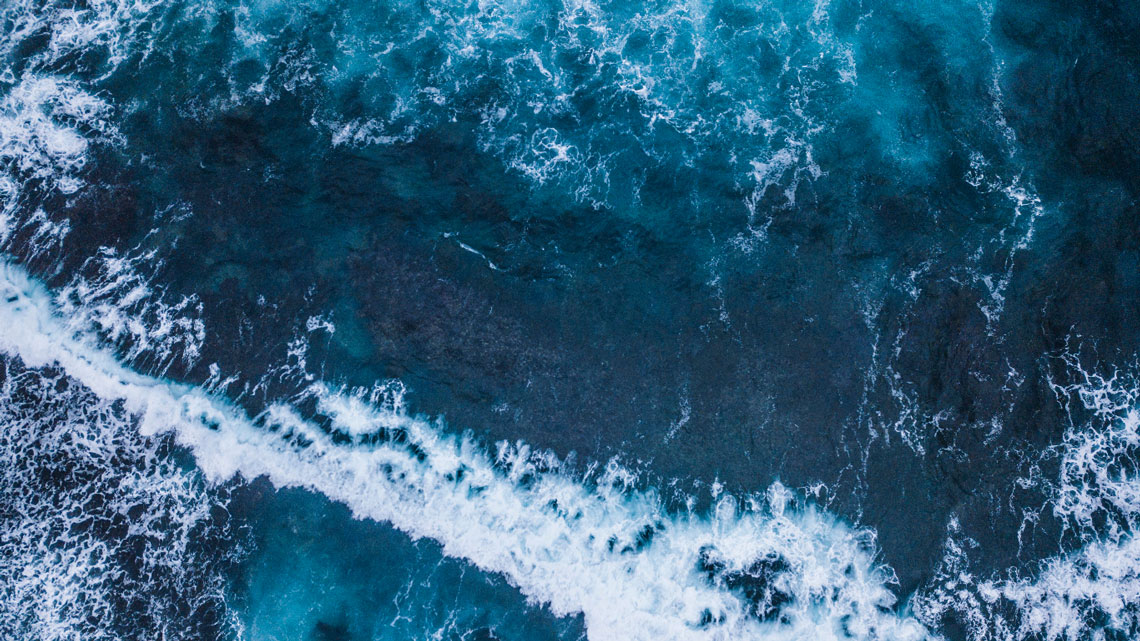Key questions >>>
- Why does the ocean matter? How is the ocean important for sustainable development?
- What does the sustainable blue economy offer us?
- What are the ocean knowledge gaps?
- How do we need to develop a multidisciplinary ocean science?
Background
The ocean covers around three-quarters of the earth's surface and contains more than 90% of living species on our planet. The ocean is also the single largest ecosystem in the world, and it provides food for billions of people worldwide, as well as maritime transport, renewable energies, and other goods and services like regulating, cultural and supporting services.
Nevertheless, the ocean is not indestructible, and our footprint is very large. Overfishing, toxic pollution, invasive species, nutrient over-enrichment, habitat degradation and destruction, biodiversity loss, dependence of a growing global population on its goods and services, and coastal development, all threaten the sustainability of coastal ocean ecosystems (Vanderweerd in Sherman and McGovern, 2011). Ocean acidification is also a growing threat that may be more important than warming, pollution and overfishing (Roberts, 2011).
Why Does the Ocean Matter?
Oceans mean different things for different people: life, passion or wonderment; vastly important; a very important source of life and energy; an incredible source of food and amazing source of biodiversity; it's wild, exciting, terrifying and exhilarating; means a lot to me, if something happens I will not have the fun I’m used to; it's a livelihood, it's been there for generations and hopefully will be there for generations to come.’ (Adapted from video excerpt, Plymouth Marine Laboratory, 2011, in Muñoz-Sevilla and Le Bail 2017).
According to the World Wildlife Fund, the ocean is currently valued at $24 trillion dollars. The goods and services from marine environments add up to an additional $2.5 trillion yearly. This means the ocean would have the seventh-largest GDP in the world. However, the value of the ocean relies on its current output, which in turn depends on its conditions. Climate change, ocean acidification, habitat destruction, pollution and overfishing are endangering the ocean and threatening its value and the security and livelihood of the three billion people who depend on it. Most of these people live in Small Island Developing States, they are among the ones who contribute least to these issues, but they are the ones at most risk, as they’re already vulnerable. (Hoegh-Guldberg 2015)
Agenda 2030: SDG 13 and SDG 14
A historical change has been taking place for the past 23 years, from Agenda 21 to Agenda 2030. At the Rio de Janeiro Earth Summit in 1992, more than 178 countries adopted Agenda 21. The Millennium declaration was adopted after the 2000 Millennium Summit in New York. 10 years after the Rio Earth Summit, in the Millennium Development Goals (MDGs) that were adopted during the Earth Summit in Johannesburg, ocean issues were included in the conversation for the first time.
In 2012, at the United Nations Conference on Sustainable Development (also popularly known as Rio+20), member states adopted the document titled “The Future We Want”, which set the process of developing the sustainable development goals (SDGs) building on the MDGs. Finally, during the UN Sustainable Development Summit in 2015, seventeen SDGs were adopted which are an integral part of the 2030 Agenda.
Progress of SDG 14 in 2019
The expansion of protected areas for marine biodiversity and existing policies and treaties that encourage responsible use of ocean resources are still insufficient to combat the adverse effects of overfishing, growing ocean acidification and worsening coastal eutrophication. As billions of people depend on oceans for their livelihood and food source, increased efforts and interventions are needed to conserve and sustainably use ocean resources at all levels.
- Ocean acidification is caused by the uptake of atmospheric CO2 by the ocean, which changes the chemical composition of the seawater. Long-term observations over the past 30 years have shown an average increase of acidity of 26 percent since pre-industrial times. At this rate, an increase of 100 to 150 percent is predicted by the end of the century, with serious consequences for marine life.
- To achieve sustainable development of fisheries, fish stocks must be maintained at a biologically sustainable level. Analysis reveals that the fraction of world marine fish stocks that are within biologically sustainable levels declined from 90 percent in 1974 to 66.9 percent in 2015.
- As of December 2018, over 24 million km2 (17.2 per cent) of waters under national jurisdiction (0–200 nautical miles from a national border) were covered by protected areas, a significant increase from 12 percent in 2015 and more than double the extent covered in 2010. The protected areas increased from 31.2 per cent in 2000 to 44.7 per cent in 2015 and to 45.7 per cent in 2018.
- Illegal, unreported and unregulated fishing remains one of the greatest threats to sustainable fisheries, the livelihoods of those who depend upon them and marine ecosystems. Most countries have taken measures to combat such fishing and have adopted an increasing number of fisheries management instruments in the past decade.
- Small-scale fisheries are present in almost all countries, accounting for more than half of total production on average, in terms of both quantity and value. To promote small-scale fishers’ access to productive resources, services and markets, most countries have developed targeted regulatory and institutional frameworks. However, more than 20 per cent of countries have a low to medium level of implementation of such frameworks, particularly in Oceania and Central and South Asia.
The Ocean Decade
To recognize that more needs to be done to mitigate the global decline in ocean health, in December 2017, the UN declared 2021 to 2030 as the decade of ‘Ocean Science and Sustainable Development’.
The Ocean Decade will strengthen international cooperation in all levels by strengthening dialogues, developing partnerships, developing capacity-building and leveraging investment, while supporting the entire 2030 Agenda for sustainable development. Other critical goals include improving ocean literacy and education to modify social norms and behaviors, and creating new models for ocean action.
The Ocean Decade aims to include science-informed mitigation and adaptation policies around the world and share knowledge with coastal communities who are most vulnerable to the changes of the ocean. (Claudet et al. 2019)
The COVID-19 Pandemic and the Ocean
From Little Blue Letter, Glen Wright
- Marine creatures are enjoying some quiet time as underwater noise levels drop. Scientists are studying these effects on marine mammals.
- From Florida to Thailand, the number of sea turtles nests has increased on the now-empty beaches. The rapid recovery of marine wildlife in coastal areas shows how extensive our impacts are and highlights the importance of protected areas.
- Fishers around the world are struggling with decreased demand, lack of sanitary conditions and logistical challenges. In some countries, like India, food security of the communities may be affected by this disruption of supply chains.
- PADI and Rash’R are producing (non-profit) reusable face masks made from Ocean plastic, with designs based on sea animals!
Final Remarks
We can all take small steps towards protecting our ocean. Reduction of single-use plastic, responsible fish consumption, avoiding ocean harming products, and making your voice heard can all directly contribute towards a healthier ocean. However, more indirect approaches can be taken by reducing the amount of greenhouse gases produced by our daily activities and, therefore, reducing our carbon footprint. Reducing red meat consumption, consuming locally sourced products and using personal vehicles less are all examples of small steps we can take towards reducing our impact. The sum of individual actions can truly make a difference in the fate of our ocean.
Collectively, we need to form a global ocean community, acknowledging that all of our actions have an impact on the ocean (Claudet et al. 2019). And, although it is incumbent on each of us to take steps to protect the ocean, collective action is also required. New models for ocean action, which are collaborative, intergenerational, cross-cultural, and multi-sectoral, are needed in the coming decade, in order to protect our beloved ocean.
The ocean is our life support system, it connects every one of us, you can think of the ocean as the blue heart of this planet, but then we look after that heart and we know how we are damaging it and it needs intensive care. We know that scientists, politicians and stakeholders are talking to each other, but it isn’t just up to them, each and every one of us can make the difference, even if the difference might be small, after all individual small drops of sea water can make up the vast ocean. (Adapted from video excerpt, Plymouth Marine Laboratory 2011, in Muñoz-Sevilla and Le Bail 2017).
Bibliography
Cheung, W. et al (2013), “Signature of Ocean Warming in Global Fisheries Catch”, Nature, 497(2013): 365–368.
Claudet, J. et al (2019), “A Roadmap for Using the UN Decade of Ocean Science for Sustainable Development in Support of Science, Policy, and Action”, One Earth, 2(1): 34-42.
Halpern, B. et al (2012), “An Index to Assess the Health and Benefits of the Global Ocean, Nature, 488(2012): 615–620.
UNESCO and UNEP (United Nations Educational, Scientific and Cultural Organization and United Nations Environment Programme) (2016), Large Marine Ecosystems: Status and Trends, Summary for Policy Makers, Nairobi: UNEP.
Muñoz-Sevilla N. and M. Le Bail M (2017), “Latin American and Caribbean Regional Perspectives on Ecosystem Based Management (EBM) of Large Marine Ecosystems Goods and Services”, Environmental Development, 22(2017), 9-17.
Munoz-Sevilla N. et al (2019), UNU Ocean Institute Scoping Study Report, Tokyo: United Nations University.
Plymouth Marine Laboratory (2011), Ocean Acidification: Connecting Science, Industry, Policy and Public (A Short Film for the Natural Environment Research Council and the UK Ocean Acidification Research Programme), Plymouth Marine Laboratory
Roberts D. (2011), In: Ocean Acidification: Connecting Science, Industry, Policy and Public. A short film for the Natural Environment Research Council and the UK Ocean Acidification Research Programme. Plymouth Marine Laboratory.
Sherman, K. and G. McGovern (2011), Toward Recovery and Sustainability of the World’s Large Marine Ecosystems during Climate Change, Gland, Switzerland: International Union for Conservation of Nature.
Sherman K. et al (2017), “Sustainable Development of Latin American and the Caribbean Large Marine Ecosystems”, Environmental Development, 22(2017), 1-8.
United Nations (2015), Transforming Our World: the 2030 Agenda for Sustainable Development, New York: UN.
Wright G. (2020), “The Pandemic and the Ocean”, Email Correspondence on May 1, 2020.
Hoegh-Guldberg, O. (2015), Reviving the Ocean Economy: The Case for Action, Geneva: World Wide Fund for Nature.
Consulted on April 24th, 2020. (2019) What is the United Nations Decade of Ocean Science for Sustainable Development?. https://www.oceandecade.org/about?tab=our-story. Consulted on May 4th, 2020.



